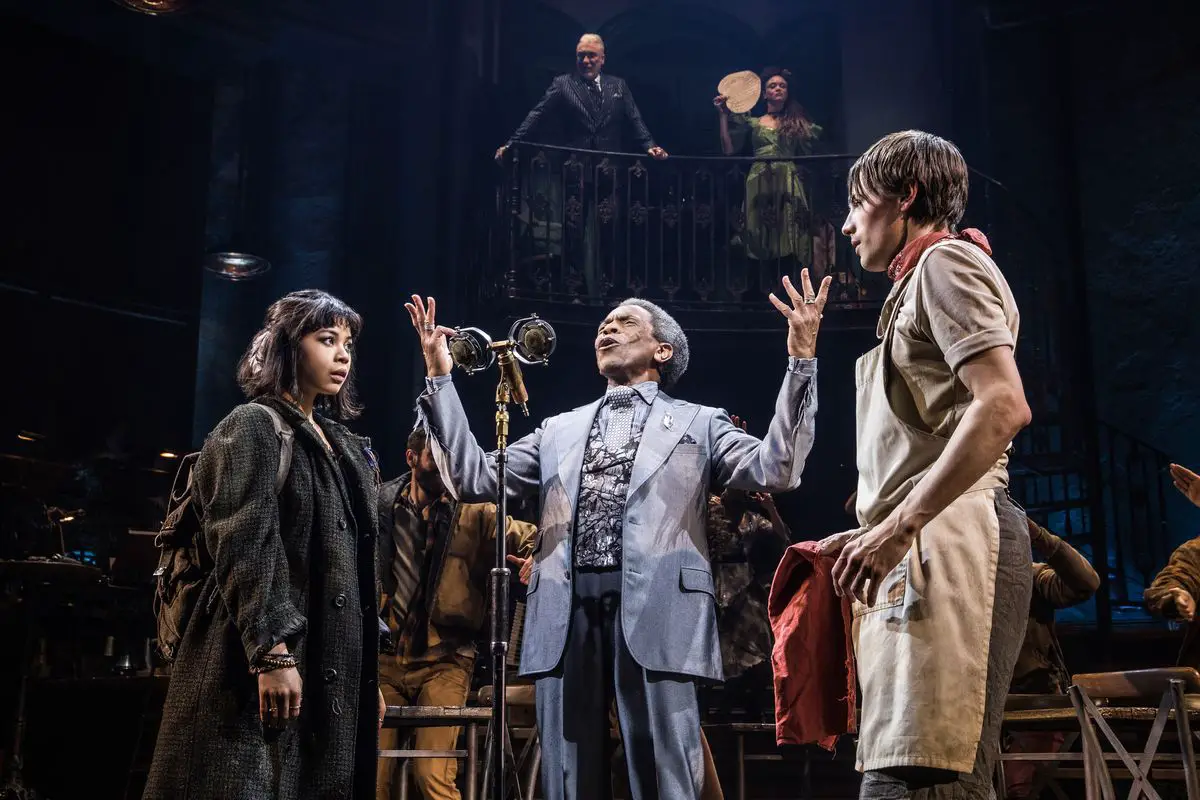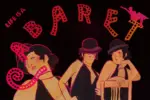Ask a theater nerd to wait up when walking on the sidewalk, and you might hear in response a wailing, “Wait for Me!” They’re referencing a song from “Hadestown,” a new Broadway musical that speaks to the inner mythology fanatic in all of us. Songwriter Anaïs Mitchell re-tells one of the classic myths, that of Orpheus and Eurydice, through folk music and dusty Americana.
The production sets the story in a vaguely post-apocalyptic Great Depression-esque setting, complete with a wisecracking Hermes and a formidable, kingpin Hades.
“Hadestown” earned praise for its excellent vocals and for Rachel Chavkin’s direction. The show won eight Tonys in June, including wins for best new musical and best original score.
“Hadestown” also demonstrates how classic myths can have contemporary relevance. The first act’s closer — a rousing full-cast number called “Why We Build the Wall” — was written back in 2010. In 2019, the song’s lyrics about poverty, paranoia and fear-based exclusion have developed fresh political relevance.
In searching for new material, composers should crack open a copy of Edith Hamilton’s “Mythology” for inspiration. Greco-Roman mythology is the foundation of many of our modern stories, so it is only natural that many would translate into excellent Broadway musicals. Here are some ideas.
1. Cupid and Psyche
Like the story of Orpheus and Eurydice, the tale of Cupid and Psyche is a romance with themes of trust and faith. The myth recounts the story of a young princess, Psyche, whose unparalleled beauty incites the envy of the Roman goddess of love, Venus. Meanwhile, Venus’ son, Cupid, shoots himself with his own arrow, which causes him to fall in love with the fair Psyche.
Cupid shields Psyche from his mother’s wrath in a beautiful palace, but he urges her to never stare at him directly. When Psyche’s faith breaks, and she uses a candle to glimpse Cupid’s face, he flies away in shame, and Psyche must work to earn her lover’s trust back.
The story of Cupid and Psyche has been the basis of many contemporary retellings. While some may be unfamiliar with the original myth, the basic plot-line inspired French writer Gabrielle-Suzanne Barbot de Villeneuve when writing “Beauty and the Beast” in the 17th century.
Yet, the original Roman version of the myth remains the strongest candidate for a Broadway adaption. All the drama and juice of the story is already there. Cupid’s arrows! The creeping candle! Likewise, the story’s themes of faith in love — as well as the bold, brassy villainy of Venus — could make for a sweeping Broadway production.
Totally Hypothetical Dream Casting: If Bernadette Peters could be a compelling Rose in “Gypsy,” seeing this Broadway supernova tackle the vengeful goddess of love would be a delight. Then, perhaps a brooding, sensitive Josh Groban as Cupid? A boy can dream.
2. Achilles and Patroclus
Homer’s epic, “The Iliad,” has been adapted onto stage before. Yet, one aspect of the story has intrigued historians and scholars alike. Many historians speculate that Achilles, the leader of the Greek army in the Trojan War, and his trusted companion, Patroclus, were lovers.
This interpretation of the ancient text has inspired artwork, novels and even an award-winning young adult novel. I believe that this version of “The Iliad” — a version that emphasizes the deep, loving relationship between Achilles and his childhood companion — would also make an outstanding Broadway musical.
If “Hamilton” can choreograph key historical battles with boundless energy, and “Bare: A Pop Opera” can showcase the steamy attraction of forbidden same-sex romance, an Achilles-Patroclus musical would thrive on the Great White Way.
Totally Hypothetical Dream Casting: Why not cast real-life couple Taylor Trench and Ben Levi-Ross as the titular pair? They both look — and, given their relationship, could certainly act — the part.
3. Pyramus and Thisbe
Let’s play some logical deduction here. One of the many classic myths Shakespeare drew from, Pyramus and Thisbe, is the foundation for “Romeo and Juliet” (and was also part of the subplot of “A Midsummer Night’s Dream”). “Romeo and Juliet” is the foundation for many musicals, including “West Side Story,” “Grease” and even “High School Musical.”
Therefore, I conclude that Pyramus and Thisbe — the original star-crossed lovers story that launched entire franchises of adaptations — would also make an excellent musical.
Pyramus and Thisbe are lovers from feuding families. Their parents forbid them from meeting, but, through a crack in their backyard wall, the two meet anyways night after night.
When Thisbe agrees to meet Pyramus in an outdoors tomb, she encounters a lioness who chases Thisbe away. She escapes, but the lioness grabs a section of Thisbe’s veil and sinks her bloody teeth into it. When Pyramus discovers the lioness and the veil, he assumes the lion devoured Thisbe, and he commits suicide.
Why move the setting to a high school or to the Upper West Side when the story is still effective in its original Babylonian setting? Pyramus and Thisbe may be the skeleton of more sophisticated versions of its story, but, if the success of “Hadestown” teaches us anything, it’s that sometimes even simple stories can translate into fabulous Broadway musicals.
Totally Hypothetical Dream Casting: I’ve had a crush on Damon Duano lately, not going to lie. Then, for Thisbe, I’d imagine we’d need someone with incredible vocal chops. I nominate Cynthia Erivo: a choice based on this video alone.
4. Prometheus
This might seem like an odd or unexpected choice, but hear me out. The story of Prometheus has all the makings of an epic one-man show.
Prometheus steals fire from the gods and delivers it to humans. Zeus punishes him by chaining him to a rock and having a vulture tear out his liver, only for Prometheus — a god and therefore an immortal — recover and then be tortured again day after day.
What does Prometheus think about while he waits to be tortured again? Does he regret his choice to give fire to mortals, or is he thankful that he unleashed evil into an overly pure world? Prometheus has time to reflect, and the audience gains a window into the mind of a god who is slowly maddening.
And if that doesn’t sound like the recipe for an excellent drama, what does?
Totally Hypothetical Dream Casting: I would like to see a comic veteran Broadway actor take the helm of this project, such as Nathan Lane or Mandy Patinkin. Prometheus should be high-strung and darkly comedic, similar to how Amber Grey plays Persephone in “Hadestown.”
* * *
Greco-Roman mythology is a cornerstone of our modern storytelling. From “Buffy the Vampire Slayer” to “The Lightning Thief” (which also has been adapted into a musical), these classic myths have made an indelible impact on modern television, film and literature. Beyond “Hadestown,” shows such as “My Fair Lady” and “The Frogs” also have roots in classic myths.
Moving forward, Broadway producers shouldn’t just limit themselves to the Greeks. Theater creatives should examine Egyptian, Norse, Persian and countless other pantheons for inspiration.
Perhaps the next Sondheim is already among us, except instead of practicing solo in the music room, the young protégé is lounging, nose buried in a book somewhere in the classics department.
















